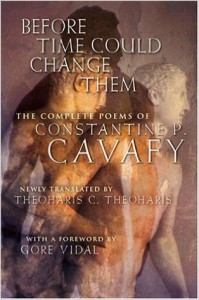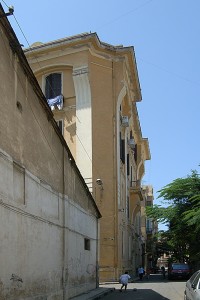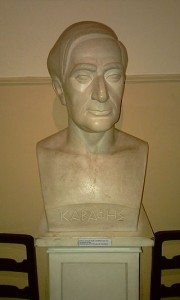Poetry in Translation (CCCLII), Constantine P. CAVAFY (1863-1933), EGYPT / GREECE: “Ionian Song”, “Cântec Ionic”
Ionian Song
Constantine P. CAVAFY (1863-1933)
Just because we have broken their statues,
just because we have driven them out of their temples,
the gods did not die because of this at all.
O Ionian land, it is you they still love,
it is you their souls still remember.
When an August morning dawns upon you
a vigor from their life moves through your air;
and at times an ethereal youthful figure,
indistinct, in rapid stride,
crosses over your hills.
* * * * * * *
Cântec Ionic
Constantine P. CAVAFY (1863-1933)
Doar pentru că le-am distrus statuile,
Doar pentru că le-am aruncat afară din templul lor,
Zeii nu au murit din pricina asta…
O, tu, pământ Ionic, ei încă te mai iubesc,
Căci spiritul lor păstrează memoria ta.
Când dimineaţa de August se oglindeşte în tine
Vigoarea vieţii ei pătrunde văzduhul,
Iar, uneori, o siluetă tânără, cerească,
Nedesluşit, păşind rapid,
Trece pe culmea dealurilor.
Rendered in Romanian by Constantin ROMAN,
© 2015 Copyright Constantin ROMAN, London
* * * * * *
SHORT NOTE: Constantine P. CAVAFY (1863-1933) was an ethnic Greek poet who lived in Alexandria and worked as a journalist and civil servant. He wrote 154 poems; dozens more remained incompleteHis most important poetry was written after his fortieth birthday and officially published two years after his death. E. M. Forster knew him personally and wrote a memoir of him, contained in his book Alexandria. Forster, Arnold Toynbee, and T. S. Eliot were among the earliest promoters of Cavafy in the English-speaking world before the Second World War.[citation needed] In 1966, David Hockney made a series of prints to illustrate a selection of Cavafy’s poems, including In the dull village.
One of Cavafy’s most important works is his 1904 poem Waiting for the Barbarians.The poem begins by describing a city-state in decline, whose population and legislators are waiting for the arrival of the barbarians. When night falls, the barbarians have not arrived. The poem ends: “What is to become of us without barbarians? Those people were a solution of a sort.”
The sensual poems are filled with the lyricism and emotion of same-sex love; inspired by recollection and remembrance. The past and former actions, sometimes along with the vision for the future underlie the muse of Cavafy in writing these poems.





No Comments so far ↓
Like gas stations in rural Texas after 10 pm, comments are closed.